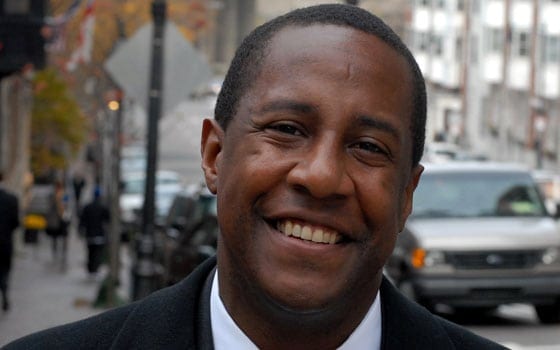
It took until the 21st century, but Massachusetts finally has finally elected its first black mayor by popular vote — the first, at least, in a large city. The state may even be said to have two now.
After his narrow victory in Newton, Setti Warren is set to become that suburb’s first black mayor when he takes office Jan. 1. The former aide to Senator John F. Kerry claims a broader distinction as the state’s first to be elected by voters.
Political scientist Ravi Perry tends to agree with that conclusion.
“I would say Setti Warren does appear to be the first popularly-elected African American” mayor, at least “in any cities of comparable size,” said Perry, a government professor at Clark University in Worcester. “There might be some small towns and villages I’m overlooking.”
In Cambridge, E. Denise Simmons has served as mayor since fellow city council members elected her last year. Before her, Kenneth Reeves was the city’s mayor from 1992 to 1995 and 2006 through 2007 after also being elected by the council.
Along with Warren, 39, another mayoral candidate who won on Nov. 3 could be described as sharing the distinction as the first to win a popular vote for mayor.
In Lawrence, William Lantigua, 54, has been hailed as being in line to become the state’s first Latino mayor. He is also a state representative who, in 2006 to 2007, served as chair of the Massachusetts Legislative Black Caucus.
A Dominican by birth, Lantigua could be considered both black and Latino—because Latinos are an ethnic group and can be of any race. A legislative aide, however, said Lantigua was content to be considered the first Latino mayor and see Warren billed as the first popularly-elected black mayor.
Warren, the son of Northeastern University administrator Joseph D. Warren, spent a year campaigning for mayor of Newton. The Boston College graduate and Navy intelligence officer who served a year in Iraq lives with his wife Tassy and one-year-old daughter Abigail in the house he grew up in.
In the September preliminary election, state Rep. Ruth Balser led a field of five candidates with 36 percent of the vote, with Warren the runner-up with 30 percent. Head-to-head in the general election, he edged her by fewer than 500 votes, 11, 210 to 10,747.
“I ran a very grass-roots campaign,” Warren said. “I knocked on 10,000 doors in the city. I changed the way campaigns are won in the city. Traditionally, this kind of grass-roots campaign has not been seen in the city.”
The upscale suburb of about 80,000 is 88 percent white, with a black population of 3 percent.
His campaign, Warren said, was modeled on Gov. Deval Patrick’s 2006 run in appealing to voters across the spectrum, rather than building from a base of support in one area or voting bloc. The mayor-elect said voters judged him on his leadership ability, capacity to unite residents and policy proposals for a fiscally-challenged city.
“Race was not an issue in this race,” Warren said. “That is very significant at this time. I’m proud of my city.”
His victory, he suggested, reflects broader changes in voting patterns and black politics.
“We’ve made progress,” he said. “We have an African American president. We have an African American governor, both of whom don’t use the lens of race when they’re dealing with issues before us as a society. I believe that had an impact on my race — no doubt.”
Perry called Warren a “crossover candidate” who was “able to build a coalition on issues and agenda items, not based on race.”
But the government professor added “there might be a drawback” because “he’s likely to have a challenge representing minority interests in a city that is that majority white.”
Perry said the election of Warren as mayor of Newton, and Ayanna Pressley and Jass Stewart as councilors at-large in Boston and Brockton, respectively, “would give credence to the idea that electing a black mayor of Boston is soon on the horizon. What is missing is an organized effort.”
He blamed machine-type politics and a lack of terms limits for the failure of any African American so far to capture the office that Mayor Thomas Menino won for an unprecedented fifth time. The professor dismissed the common argument that the reason is Boston’s black population, about 25 percent, is too small.
“The black community is not that small,” Perry said. “We’ve elected black mayors in Seattle, Houston, Denver, Los Angeles — all cities that have less of a black population than Boston.”






